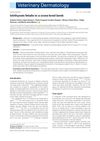 4 citations,
December 2013 in “British Journal of Dermatology”
4 citations,
December 2013 in “British Journal of Dermatology” ESR2 gene linked to female-pattern hair loss.
 3 citations,
May 2023 in “Frontiers in immunology”
3 citations,
May 2023 in “Frontiers in immunology” Faulty inflammasome activation may lead to autoimmune skin diseases and could be a target for new treatments.
 3 citations,
September 2022 in “Frontiers in veterinary science”
3 citations,
September 2022 in “Frontiers in veterinary science” Melatonin affects cashmere growth in goats by influencing stem cell and certain signaling pathways.
 3 citations,
August 2022 in “Archives animal breeding/Archiv für Tierzucht”
3 citations,
August 2022 in “Archives animal breeding/Archiv für Tierzucht” Certain genetic changes in the KAP22-1 gene are linked to better wool quality in Egyptian sheep.
 3 citations,
June 2022 in “European journal of human genetics”
3 citations,
June 2022 in “European journal of human genetics” A new type of pachyonychia congenita linked to a specific keratin gene mutation was found in two Pakistani families.
 3 citations,
February 2020 in “The journal of gene medicine”
3 citations,
February 2020 in “The journal of gene medicine” A mutation in the HR gene causes a rare form of irreversible hair loss in two Kashmiri families. Whole exome sequencing is effective for finding such mutations.
 3 citations,
March 2017 in “International journal of women’s dermatology”
3 citations,
March 2017 in “International journal of women’s dermatology” Some domesticated animals have the same genetic skin diseases as humans, which can help doctors understand human genetic mutations.
 3 citations,
December 2014 in “Journal of Clinical Oncology”
3 citations,
December 2014 in “Journal of Clinical Oncology” Men with a certain baldness pattern at age 40-50 may have a higher risk of aggressive prostate cancer.
 2 citations,
August 2023 in “Development”
2 citations,
August 2023 in “Development” Hair follicles in the back of the rosette fancy mouse have reversed orientations due to a gene mutation.
 2 citations,
March 2022 in “Research Square (Research Square)”
2 citations,
March 2022 in “Research Square (Research Square)” Seasonal changes affect gene activity linked to hair growth in Angora goats, influencing mohair quality.
 2 citations,
September 2020 in “Schweizer Archiv für Tierheilkunde”
2 citations,
September 2020 in “Schweizer Archiv für Tierheilkunde” Swiss Holstein cattle with curly, short hair carry genes from the Simmental breed.
 2 citations,
July 2015 in “Archives of Dermatological Research”
2 citations,
July 2015 in “Archives of Dermatological Research” A new gene variant in the DSP gene is linked to a unique type of hair loss.
 2 citations,
January 2013 in “Elsevier eBooks”
2 citations,
January 2013 in “Elsevier eBooks” The document explains the genetic causes and characteristics of inherited hair disorders.
 2 citations,
January 2002 in “Hormone Research in Paediatrics”
2 citations,
January 2002 in “Hormone Research in Paediatrics” Molecular diagnostics help identify genetic defects causing endocrine diseases, improving diagnosis and treatment options.
 1 citations,
September 2023 in “Clinical, cosmetic and investigational dermatology”
1 citations,
September 2023 in “Clinical, cosmetic and investigational dermatology” Certain genetic variants linked to immune response increase the risk of alopecia areata in Taiwanese people.
 1 citations,
June 2023 in “Biomolecules & therapeutics”
1 citations,
June 2023 in “Biomolecules & therapeutics” Nitric oxide is important for skin functions and both helps protect against and contributes to skin inflammation and sensitization.
 1 citations,
January 2020 in “Research Square (Research Square)”
1 citations,
January 2020 in “Research Square (Research Square)” Inherited color dilution in Rex rabbits is linked to DNA methylation changes in hair follicles.
 1 citations,
January 2020 in “Benha Journal of Applied Sciences”
1 citations,
January 2020 in “Benha Journal of Applied Sciences” Certain gene variations may increase the risk and severity of alopecia areata.
 1 citations,
January 2019 in “Elsevier eBooks”
1 citations,
January 2019 in “Elsevier eBooks” Neuroactive steroids may affect the risk and treatment of alcohol use disorders.
 1 citations,
August 2018 in “bioRxiv (Cold Spring Harbor Laboratory)”
1 citations,
August 2018 in “bioRxiv (Cold Spring Harbor Laboratory)” A new mutation in the TMEM173 gene and a risk allele in IFIH1 cause a unique set of immune-related symptoms.
 1 citations,
July 2018 in “Elsevier eBooks”
1 citations,
July 2018 in “Elsevier eBooks” Heredity and hormones cause common hair loss, and topical minoxidil is the first recommended treatment.
 1 citations,
January 2018 in “Side effects of drugs annual”
1 citations,
January 2018 in “Side effects of drugs annual” Diuretics can cause serious side effects and should be used carefully.
 1 citations,
June 2017 in “Veterinary dermatology”
1 citations,
June 2017 in “Veterinary dermatology” A cross-bred lamb with severe skin and movement issues had ichthyosis fetalis but normal vitamin A levels.
 1 citations,
January 2017 in “Springer eBooks”
1 citations,
January 2017 in “Springer eBooks” Understanding the immune-related causes of Alopecia Areata has led to potential treatments like JAK inhibitors.
 1 citations,
November 2015 in “Indian Journal of Clinical Biochemistry”
1 citations,
November 2015 in “Indian Journal of Clinical Biochemistry” The conference presented findings on how vitamin D levels, genetic factors, and lifestyle choices like smoking and yoga affect various health conditions and diseases.
 June 2024 in “Research Square (Research Square)”
June 2024 in “Research Square (Research Square)” Young women in West Bengal, India, with PCOS often have estrogen resistance, leptin receptor issues, folate deficiency, T2DM, and acanthosis, commonly linked to obesity.
 May 2024 in “Frontiers in medicine”
May 2024 in “Frontiers in medicine” A genetic mutation in the LIPH gene causes tightly curled hair that stops growing in some Japanese individuals.
 April 2024 in “Cell death and differentiation”
April 2024 in “Cell death and differentiation” Cell death shapes skin stem cell environments, affecting inflammation, repair, and cancer.
 March 2024 in “Frontiers in genetics”
March 2024 in “Frontiers in genetics” Xiangdong black goats have moderate genetic diversity, minimal inbreeding, and important genes for reproduction, immunity, and other traits.
 January 2024 in “Frontiers in endocrinology”
January 2024 in “Frontiers in endocrinology” The study suggests that hypothyroidism may cause alopecia areata.






























